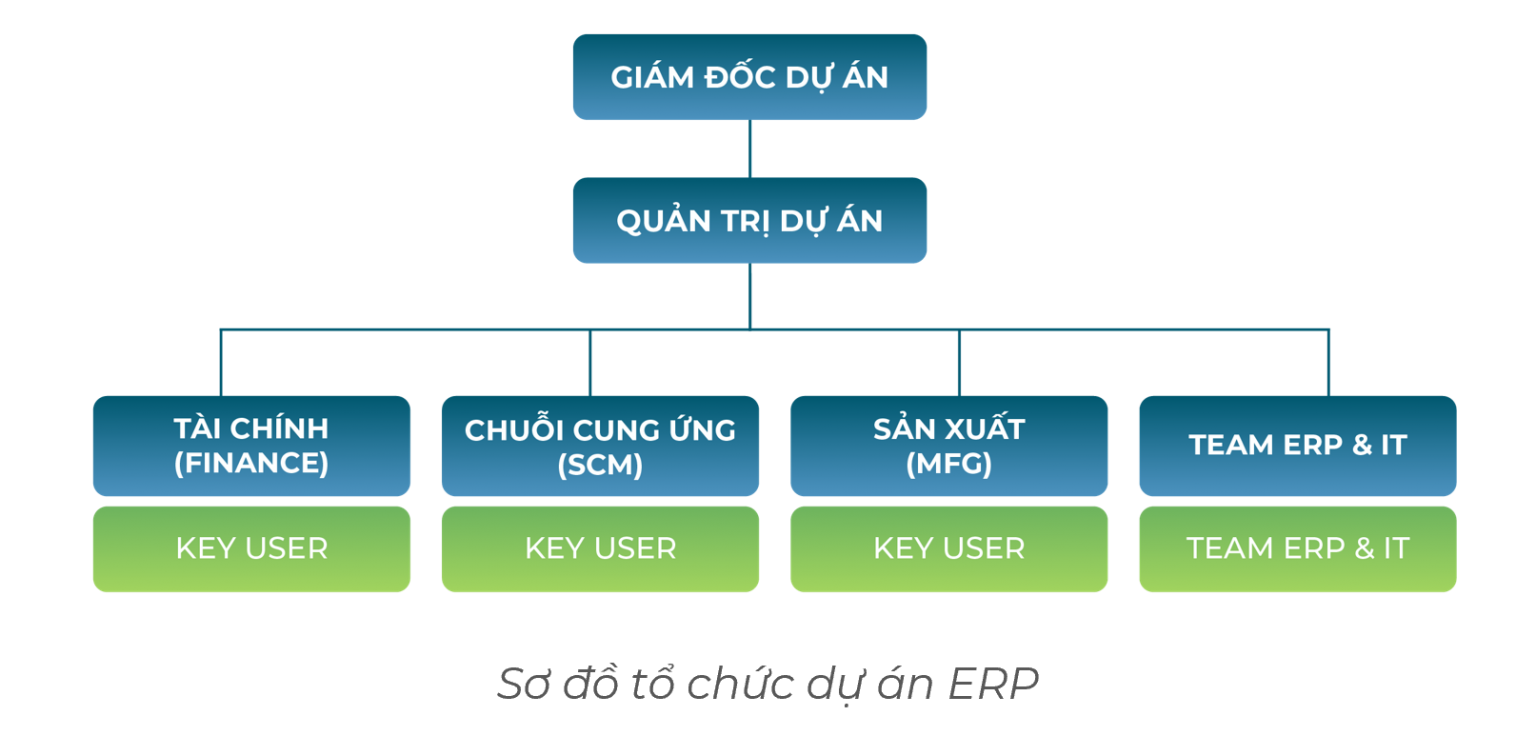ERP project implementation is conducted in all departments and divisions of the enterprise. The ERP system changes the way of interaction as well as the operating process between departments. Therefore, for the ERP implementation project to be successful, put into operation, and exploited effectively is a challenge for many businesses. As an ERP implementation partner with many global businesses and domestic companies, Citek has drawn out the following 07 important factors to help implement ERP projects successfully as follows!
1. Determine the correct needs and scope of operations to be implemented
Business owners and executives need to clearly identify the difficulties, challenges and problems their businesses face today as well as in the next 3 to 5 years. to determine the correct investment needs for the ERP system and the scope of ERP operations that need to be deployed, in accordance with the business's development roadmap and the ability of the company's personnel to receive and operate it.
 Determine the correct needs and scope of operations to be implemented
Determine the correct needs and scope of operations to be implemented
Choose the right ERP implementation partner
After clearly identifying the needs and problems, the business will proceed to select a suitable implementation partner. The implementation partner must have a lot of experience and must be proven through practice to have successfully deployed ERP solutions in many businesses in the same field with a business scale equal to or larger than the current business scale. For Implementation partners need to clearly understand the profession, regulations of Vietnamese accounting as well as Vietnamese corporate culture to easily exchange, coordinate and discuss during the solution building process. , solution transfer, end user training and support when the system officially operates.
2. Enterprise personnel participating in project implementation
The implementation of ERP solutions is carried out in all departments and divisions of the entire enterprise, affecting management activities throughout the enterprise from senior managers to middle managers and executive staff. Operational. Deploying ERP changes the way of interaction as well as the operating process between departments.
Therefore, it is necessary to mobilize personnel from all departments to participate in the ERP project for a certain period of time from 4 to 6 months. Roles involved in an ERP project will typically include the following positions: Project Director, Project Administrator and Key User.
 ERP project organization chart
ERP project organization chart
Project Director: Usually the General Director, Deputy General Director, Director of Strategy
- Is the person with the highest authority to determine the goals and implementation scope of the project.
- Full understanding of the company's industries and operating processes.
- Be a reputable person, capable of connecting, motivating and motivating project members to achieve the project goals.
- Assign resources and commit time to participate in the project.
- Pioneering in applying system standard processes and solutions.
- Approve major changes related to integration solutions between departments if the departments cannot connect and resolve themselves.
- Average time participating in the project: 01 day/week or when a problem arises that requires the Project Director to make a decision.
Project management: Usually Deputy General Director, Information Director, Finance Director, Project Administrator with experience in implementing ERP
- Know clearly the industry and business activities of the company, be able to connect and coordinate with departments to implement projects.
- Develop an implementation plan and deploy the agreed work plan to departments and divisions.
- Define and manage project goals, scope and deliverables.
- Monitor progress and support departments to carry out work according to the proposed plan.
- Coordinate with departments to resolve problems arising in the project weekly as soon as they arise.
- Report project status to Project Director and project team weekly.
- Organize project communication.
- Time to participate in the project: 01 session/day
Key – Users:
- Are people who understand the business processes of the subsystem they are in charge of.
- Provide complete information about the current status of processes and forms being used at the company.
- Coordinate with partners to provide the most appropriate solutions for the range of modules you manage.
- Participate and unify the business processes presented by consulting partners.
- Review and confirm solutions within the module under your responsibility.
- Mobilize professional staff of the subsystem you are in charge of to participate in the project when necessary.
- Run tests of the new system and accept the system.
- Retraining for End-Users.
- Average time participating in the project: Average 01 session/day in relevant stages of the project (survey, solution review, system acceptance testing).
- The more participation of leaders and managers at all levels in the ERP project, the higher the success rate of the ERP project.
3. Comply with ERP implementation methodology
The ERP implementation methodology is built and summarized by companies based on the experience of successfully implementing ERP for thousands of businesses around the world.
Therefore, to ensure successful implementation, effective use of resources and minimize risks when implementing ERP, businesses need to strictly comply with the implementation methodology developed by the ERP company. This is also a necessary and prerequisite condition for successfully implementing an ERP project.
 ERP implementation process
ERP implementation process
4. Applying ERP company's Best Practices
Buying an ERP system means buying integrated processes and advanced management experience that meet international standards, so businesses must exploit and apply standard processes and system integration. Enterprises that want to standardize production and business activities and expand their scale must apply standard procedures (Best Practices) to unify the management and operating criteria of the entire company, factory, and branch.
 Application of best practices
Application of best practices
Application of standard processes (Best Practices) in ERP implementation will bring the following benefits to businesses:
- Apply processes that have been researched and successfully implemented in practice by large enterprises, helping the ERP system operate more effectively.
- At the same time, it cuts costs for system research, helping to optimize company resources.
- Limit problems arising from the system.
5. Training and system conversion
Training key users (Key Users) and end users (End Users):
Using the Train the Trainer method means that the implementation partner will train the business's Key Users team to perform proficiently on the system. After that, Key Users will check the system against the agreed solution. Once confirmation is completed, the project will be moved through the conversion phase for official operation and Key Users will plan to retrain end users (End Users).
 Train the Trainer Method
Train the Trainer Method
The Train the Trainer method helps key users (Key Users) have good control and mastery of the system when officially put into operation. The main user will directly train and guide new people when there is a change in personnel. The system conversion is very important, because this is master data and the opening balance is recorded. First conversion into the system to officially operate the system. To successfully convert data and ensure accuracy, businesses must have at least 3 conversions before putting the system into official operation.
6. Official operation
The ERP system is officially in operation, businesses only operate one system to ensure the system can operate online.
Arising transactions must be entered and controlled immediately on the ERP system, daily work control on the ERP system, all documents and reports printed from the system to control, sign documents, circulate and store documents.
 The system was officially put into operation
The system was officially put into operation
7. Communication during ERP system implementation
To successfully implement an ERP project, businesses need top leaders to participate in communicating and promoting the ERP project.
Communication is a very important activity in the project. Carrying out regular and periodic communication will help promptly update important information and milestones achieved in the project. From there, it helps the entire project team and the company update the ongoing project progress.
When the board of directors directly participates in communication, it will create cohesion between relevant departments, while promoting and committing to successful project transformation.
 Enterprises need top leaders to participate in implementing communication and cheerleading for ERP projects
Enterprises need top leaders to participate in implementing communication and cheerleading for ERP projects
WAY OF COMMUNICATION
- Develop an overall and detailed communication plan for each stage.
- In each stage, it is necessary to carry out communication on main and important contents:
- Through newsletters, decisions, mini games, online tests and communication to all relevant employees (Meeting, Mail, Poster, Banner, News).
- Organize face-to-face meetings and communicate the goals and importance of each stage.
- Each phase of the project needs a periodic newsletter after completion.
Conclusion
In Vietnam, currently the need to apply ERP systems is also of interest to businesses and has become an inevitable trend in business operations and governance to improve efficiency. management capacity, optimize costs and increase competitiveness when participating in the global playing field.
 The need to apply ERP systems is gradually becoming an inevitable trend in business operations and management< /figcaption>
The need to apply ERP systems is gradually becoming an inevitable trend in business operations and management< /figcaption>
To successfully deploy an ERP project requires a lot of attention and commitment from leaders at all levels in the project. The experience of implementation partners is proven through the practice of successful projects, the team The project complies with the implementation process and applies ERP standard processes suitable for the business.
Citek is a consulting business implementing a comprehensive set of digital transformation solutions (ERP solution Oracle NetSuite & SAP) , MES, Data Collection, CRM, Data Warehouse, Business Planning, Business Intelligence,...
Citek has gained the trust of global companies and leading domestic companies such as: Hoa Phat Group, Gelex Group, Loc Troi Group, Eurowindow, THP Group, Adidas, Phenikaa, Nanogen Pharmaceutical, Cadivi, Thibidi, Honda Vietnam, Minh Phu Seafood, Nippon Paint, Ton Nam Kim, SMC Steel, Diana, Big C, Novaland, Mitsubishi Electric, Tecan,...
With important contributions in the field of Digital Transformation, recently, Citek was honored at the TOP 10 VIETNAM IT ENTERPRISES 2021 Award, SAO KHUE Award 2021 and Vietnam Gold Star Award 2021. Besides, Citek is also the only partner in Vietnam to be honored by SAP SAP S/4HANA Partner of The Year 2020, the fastest growing partner of SAP in the Asia Pacific region 2019.